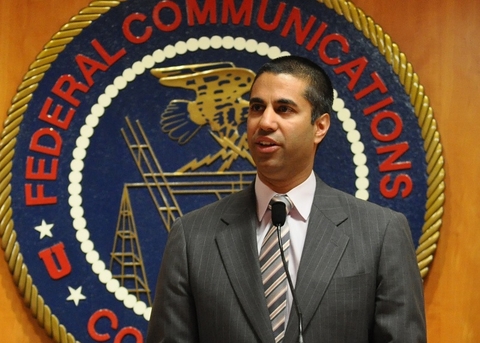As the FCC moves to update the copper retirement process at its upcoming monthly meeting this Thursday, Chairman Ajit Pai has been making his case heard that a more streamlined method will drive service providers to ramp up broadband network investments.
Ajit Pai, chairman of the FCC, told attendees during the recent Reason Media Awards that a friendlier regulatory regime will give service providers more freedom to replace aging copper facilities with fiber.

“We will vote on making it easier for broadband providers to move from the copper networks of yesterday to the fiber networks of tomorrow,” Pai said during the Reason Media awards, according to a transcript. “Some of these copper lines have been in the ground for a century. They’re nowhere near as resilient or robust as fiber. But our rules too often still demand that companies maintain those fading networks. That comes at a cost to consumers. By definition, every dollar that a company spends propping up copper is a dollar that can’t be spent building a next-generation network. That’s the kind of red tape that needs to be cut.”
RELATED: AT&T, Verizon say 90 days is enough for copper retirement notices
Pai also called out the those who oppose new changes to the copper retirement process.
“Here too, this proposal has its detractors,” Pai said. “They refuse to let go of the past and stoke fears about the future. They also complain, ironically, that we don’t have enough Internet access or more competition—precisely what we’d get by ridding the rust from our regulations.”
During the Thursday monthly meeting, the regulator will consider its Report and Order, Declaratory Ruling and Further Notice of Proposed Rulemaking and Order to revise and seek comment on further changes to the Commission's pole attachment rules, network change disclosure processes and section 214(a) discontinuance processes. The regulator said these efforts are focused on removing “barriers to infrastructure investment and promote broadband deployment.”
In April, the FCC the regulator put out its Accelerating Wireline Broadband Deployment by Removing Barriers to Infrastructure Investment notice of proposed rule-making to allow ILECs, CLECs and others affected by proposed changes the chance to comment.
Under the proposal, the FCC set a few common goals: easing the transition to IP networks, streamlining network notification rules, eliminating rules that require service providers to dedicate capital to maintain TDM equipment and speeding up the legacy service discontinuance process.
Telcos call for simplicity
Copper retirement overall has been a divisive issue between service providers and even amongst FCC commissioners, some of which are concerned that changes could compromise end-user service.
Traditional telcos such as AT&T, CenturyLink and Verizon—all of which are migrating more of their customers to fiber—said the copper retirement notice period should be shortened to 90 days.
Former FCC Chairman Tom Wheeler in the regulator’s 2015 Technology Transitions Order developed a longer 180-day period. As part of that order, the FCC proposed giving competitive carriers and businesses a six-month notice, while residential customers get three months’ notice before copper facilities are shut down.
According to these rules, AT&T, Verizon and other ILECs are required to provide notice to CLEC wholesale customers that use copper facilities to deliver voice and Ethernet over Copper (EoC) services to business customers. ILECs would also be given the option to retire copper networks and replace them with fiber without prior commission approval, but only if no service is discontinued, reduced or impaired.
Verizon, for one, continues to retire copper throughout its wireline footprint, focusing initially on larger cities and towns.
In September, the service provider filed requests with the FCC in towns and cities in the legacy ILEC markets of Virginia, New York, New Jersey, Pennsylvania, Rhode Island, Massachusetts, Maryland and Delaware.
The telco has encouraged the regulator to repeal its existing prohibition against disclosing a contemplated copper retirement prior to filing notice. Verizon claimed this process “keeps us from efficiently working with customers and landlords to help coordinate deployment of fiber and migration to newer technologies.”
Likewise, AT&T has been an advocate of copper retirement reforms with an eye on ensuring clarity. The telco claims that the current copper retirement notice process can cause confusion for retail residential and business customers.
“Customers will be contacted to schedule appointments for any required changes in equipment at the customer’s premises,” AT&T said in an earlier FCC filing (PDF). "A rule requiring retail notices—and the contents of those notices—is redundant, and a rule that requires months of advanced notice is confusing to customers and thus harmful.”
CLECs raise concerns
While traditional telcos are calling for simpler copper retirement policies, other service providers like Windstream, which operates as both an ILEC and a CLEC to business customers, is concerned about the impact it and other competitive providers face in the transition of business customers to new services.
A key concern Windstream raised in a previous FCC filing (PDF) that not being able to get access to these facilities makes it challenging to provide EoC services in areas where it can’t make an initial case to build fiber to buildings.
The service provider suggested in an earlier filing that “if the Commission returns to the 90-day notice period, it should reinstitute the objection process so that interconnecting carriers may obtain additional time if necessary to maintain uninterrupted service to retail customers.”
Likewise, TelePacific which is now known as TPX Communications, raised similar issues. The CLEC said it is concerned that an ILEC's copper loop retirement could potentially cause it from having to discontinue provisioning service to a community or part of a community.
